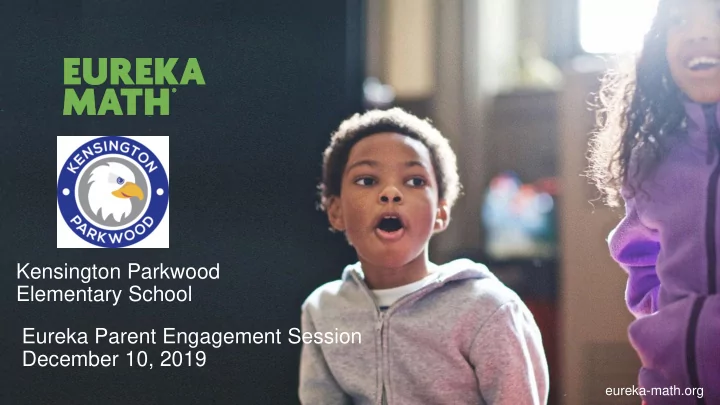

Kensington Parkwood Elementary School Eureka Parent Engagement Session December 10, 2019 eureka-math.org
Agenda • Welcome & Introductions • The Shifts: Curriculum 2.0 to Eureka! • Eureka Math Lesson Components • Tools and Strategies for Students • Breakout Sessions • Evaluation Video •
Outcomes By the end of this parent engagement session, participants will be able to; • Articulate the rationale for the change in curriculum. • Describe the components of a Eureka lesson. • Name some of the learning tools. • Work through a Eureka lesson at or near child’s grade level. • Evaluate the session.
Why did we need new materials? 2010 2013 2017 2019 New Standards Curriculum 2.0 Curriculum Review New Materials Maryland adopts the MCPS is using MCPS partners with MCPS launches a Maryland College and Curriculum 2.0, a JHU to conduct a three year roll out of Career Ready home-grown set of comprehensive new ELA and Math Standards ELA and Math review of the materials across the materials throughout curriculum in ELA and district K-5 schools Math, K-8 The 2017 JHU Review included a 360° analysis of: ● written curriculum - the materials provided by MCPS as Curriculum 2.0 as well as the actual materials in use in classrooms. ● taught curriculum - how the curriculum is used day to day in classrooms (teacher practice) ● learned curriculum - the assignments students are given, their performance on those assignments, as well as their performance on other assessments (PARCC, etc.) MCPS requires a curriculum to be reviewed every five years, so this review was timely!
JHU found that the materials in use were not consistently well aligned to Maryland’s College and Career Ready Standards. This comports with national data (captured below). Source: The Opportunity Myth, 2018
Curriculum is an important lever in impacting student experience and outcomes
Why Eureka? Eureka meets the three criteria for strong instructional materials according to an in depth, third party review by Ed Reports. They received an “all green” rating on: ● focus and coherence ● rigor and mathematical practices ● usability for teachers and students
Eureka!
How is Eureka different? It focuses on “mathematizing.” “Mathematizing” Answer-getting • Math as a verb. • “Process of modeling reality with the use of mathematical tools.” • “Process of constructing meaning.” • Process of applying mathematical ideas to a problem. (Fosnot & Dolk, 2001)
How is Eureka different than curriculum 2.0? It focuses on the three aspects of rigor. Procedural Skill & Fluency Students develop efficiency and accuracy in computations. Conceptual Understanding Students build a deep understanding of the how and why of mathematics. Application Students identify the appropriate concepts and skills to tackle novel problems and tasks.
What is EUREKA MATH? Each lesson in Eureka is comprised of four critical components. Each component serves a distinct purpose. • Fluency practice • Application problem • Concept development (including the problem set) • Student debrief (including the Exit Ticket). Together they promote balanced and rigorous instruction and mathematizing .
MODELS • Tools for problem solving • Used throughout the curriculum • Build from lesson-to- lesson, grade-to-grade GreatMinds.org/Parents
Tape Diagrams
Number Bonds -First Grade
Number Bonds • Fractions, 3 rd grade Meters and centimeters, 4 th grade
Fluency Fluency Examples • Finger Counting Exercises • Whiteboard Responses • Conversions • Calculations • Sprints And More!
Application Problem This component is included to provide students with an opportunity to apply the skills and understandings they have already learned in new ways within the framework of a real world problem.
Concept Development This component addresses the new content being studied. The concept development is generally comprised of carefully sequenced problems centered within a specific topic to begin developing mastery via gradual increases in complexity. It is also accompanied by an additional set of carefully crafted problems called the “problem set. ” This is designed to give students a chance to practice the content just introduced on their own.
Debrief Every lesson closes with this critical component in which the teacher engages students in a whole-group discussion, challenging them to share their thinking and draw conclusions. This allows the teacher to gauge student understanding of the concept of the lesson, offering another chance for students to gain understanding before attempting the exit ticket.
Your Turn- Experiencing Eureka Math You’re invited to engage in a math lesson at or near your child’s grade level. • K-2 Sessions 1 and 2 will meet in Room 35 (Mrs. Lee’s 3 rd grade classroom) • Grades 3-5 Sessions 1 and 2 will meet in Room 39 (Mrs. Park’s 3 rd grade classroom) • The first session will run from 7:20-7:50. • The second session is from 7:55-8:25. ENJOY YOUR SESSIONS!
TIPS FOR HELPING YOUR CHILD • Have your child explain what concepts they are learning. • Ask questions: • Can you explain? • What strategy did you use? • How else can you solve it? • Be positive about your child’s math education. • Use Eureka Math Parent Resources: • Parent Tip Sheets • Homework Helpers • Videos GreatMinds.org/Parents
Parent Resources MCPS Website - Family Mathematics Support • • https://www.montgomeryschoolsmd.org/curriculum/math- support/elementary/grade4.aspx Homework Helpers – Come with every homework assignment • Parent Tip Sheets • • https://greatminds.org/resources/products/group/eureka-parent-tip-sheets Curriculum 2. 0 Parent Newsletters for 4/5 and 5/6 Mathematics • • https://www.montgomeryschoolsmd.org/curriculum/2.0/parent- newsletters.aspx
Recommend
More recommend